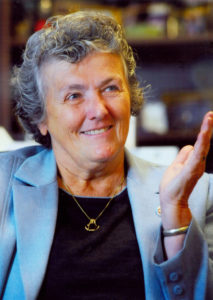 Joan Chittister, a member of the Benedictine Sisters of Erie, PA, has been a visionary leader and important spiritual figure in America and around the world for over four decades. Now in her 82nd year, she continues to be a passionate champion for the rights of women everywhere, and a fervent advocate for the oppressed and marginalized, particularly those in prison.
Joan Chittister, a member of the Benedictine Sisters of Erie, PA, has been a visionary leader and important spiritual figure in America and around the world for over four decades. Now in her 82nd year, she continues to be a passionate champion for the rights of women everywhere, and a fervent advocate for the oppressed and marginalized, particularly those in prison.
Sr. Joan is a founding member of The Global Peace Initiative of Women, a partner organization of the U.N. Currently serving as its co-chair, she has facilitated gatherings of spiritual leaders throughout the Middle East, Asia, Africa, the Far East and Europe, fostering an interfaith commitment to peace.
Sr. Joan has served as president of the Leadership Conference of Women Religious, president of the Conference of American Benedictine Prioresses, and was prioress of the Benedictine Sisters of Erie for 12 years. She is the founder and executive director of Benetvision, a resource and research centre for the development of contemporary spirituality. Sr. Joan is also the creator and animator of Monasteries of the Heart, a web-based movement sharing Benedictine spirituality with seekers everywhere.
A popular international speaker and bold, prophetic voice in our times, Sr. Joan is a best-selling author of over 50 books. Her latest book is entitled The Time is Now: A Call to Uncommon Courage. In it, she draws on the wisdom of prophets, both ancient and modern, to better understand and confront the oppressive forces in our society. Her powerful and practical message is timely, and invites us to put our spirituality into practice with courage and love.
Here are some audio highlights from our delightful conversation with Sr. Joan, with original music by Gillicuddy (2:43).
Interview by Laura Locke
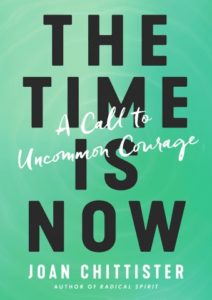 Kolbe Times: May I just say that I found your book to be an important call to me personally, as well as a great read. I’m a middle child, and I think that’s led me to always subconsciously take on the role of a peacekeeper – but not necessarily a peacemaker. Especially as a child, I was quite shy, and too concerned about being “nice” to everybody.
Kolbe Times: May I just say that I found your book to be an important call to me personally, as well as a great read. I’m a middle child, and I think that’s led me to always subconsciously take on the role of a peacekeeper – but not necessarily a peacemaker. Especially as a child, I was quite shy, and too concerned about being “nice” to everybody.
Joan Chittister: Isn’t that so often the truth! You know, I say somewhere – in one of my writings – that we have, as Catholics at least, brought children up to be nice, and then told them that was being good. So we have an awful lot of nice Catholics, who know the Gospel and have fought religious wars on its behalf, and yet at the same time will not raise a voice or a finger to confront anything that’s going on in front of their faces.
Kolbe Times: And as you know, up here in Canada, we do “nice” very well – maybe a little too well. I think this is a very good time for many of us to reflect on that, and your book is an excellent way to kick-start the process.
Joan Chittister: Yes, I think niceness is in your DNA in Canada. I’ve had wonderful, wonderful relationships with religious in Canada, and I discovered, on so many important issues, that when they got it, they really got it. And when they got it, they would move on it – nicely.
Kolbe Times: That’s good to hear!
I also wanted to say how much I appreciate the format of your book, with short, very compelling chapters followed by a little personal reflection. I loved all the great quotes you sprinkle throughout, too. I can see how your book would be excellent for a group to read together, as well as for individuals.
Joan Chittister: I’m hoping that we’ll get this book into all kinds of intentional communities, because I think they’re the ones who are there, together, for some particular Gospel reason to begin with. They’re already focused on the unanswered questions. I’m thinking of peace groups, and justice groups; lay communities as well as religious. I know many Protestant churches that are very socially-minded, and sometimes whole congregations do a group study. I want to encourage people to get together and find out more about the issues that they’re concerned about – that’s where this book came from, and that’s why I wrote it.
Kolbe Times: You recently described how you’d been feeling that things are getting increasingly dangerous in the world, but so many voices are muted…and those feelings led you to think deeply about the experiences of the prophets in the Bible.
Joan Chittister: I have to admit to you that reading the prophets has always been a particular confrontation with my own conscience. They fascinated me for years and years as a young Sister. Who were these people? What were they doing? What were these strange texts about? It takes an awful lot of historical study to be able to understand even the references that they’re using. Because I’m a Benedictine, and because we read the Psalms and Scriptures three to five times a day, every day of your life – along with the Benedictine Rule, which is forever cherry-picking the Scriptures – you’re confronted with the prophets, the psalmists, and of course Jesus, day in and day out for your entire life.
I began to realize that in my own early spiritual development, the prophets weren’t mentioned that much, as if they were from another age and therefore had nothing to do with this one. But the more I studied all the major and minor prophets, the more I realized that they are so much like us! They confronted the very issues that we are confronting, and struggling with, year after year in our own lives: militarism, discrimination, greed, injustice, corruption. I also began to see that I had been surrounded by prophets in my own generation; people like Dorothy Day and Thomas Merton. They walked in the footsteps of those ancient prophets, and we have lost sight of the phenomenal spiritual cement in their feet. I said to myself, “Joan, there’s something vital that is missing today. Prophetic spirituality has disappeared.”
I went from audience to audience, and every audience would ask, with great seriousness, “Joan, what should we be doing?” And I would give answers that I thought were clear, and I would even secularize my answers. I would talk about groups in the country that were very avid about important things like labour unions, cleaning up the oceans, using alternative energy sources like wind power. I would talk about determining the issue that was closest to their own lives and hearts, and I would encourage them to find the groups that are speaking about it and support them.
But, you know, every time I turned on the television, I was more and more discouraged. I felt like I was losing my country right under the soles of my shoes. America was disappearing, and what was I doing? One morning, I woke up and I said, “Well, there’s one thing I can do in the middle of all this, and that’s to beg people to find out what’s going on, study the issues, and at least say, ‘Not in my name’.”
I wrote this book out of the tenor of this time. I did it with a great deal of personal struggle and angst – not because I didn’t want to do it, but because that “niceness” that we talked about earlier tends to follow you. It’s such a disease! It’s this fear of criticizing anything, or upsetting anyone. It’s so easy to back away and rationalize it by saying to yourself, “Don’t worry about it. It’s not your role to get involved. This is just politics.”
Kolbe Times: I really appreciated your descriptions of those forces that keep us passive in the face of blatant injustice. It was an eye-opener, and really led to some self-examination on my part.
Joan Chittister: It’s important to be aware of these things, or we’ll never have the courage to face them and overcome them. For me, suddenly I knew it was now or never. I asked myself, “Where and how are you going to insert yourself into a conversation about the loss of qualities like integrity, commitment, genuine human analysis, wisdom, and honesty?”
I grew up at the tail end of World War II. I spent 40 years asking myself, how in heaven’s name could Germany, a great Lutheran/Catholic nation, have allowed a Hitler? And I have discovered in the last three years of my life how easy it is to watch your country slip away, one value at a time.
Kolbe Times: Besides reminding us of the stories of the Old Testament prophets, I thought it was great how your book also points out that Jesus was a prophet, too – and we tend to forget about that. You write about how personally reassuring it is to follow and imitate Jesus the healer, who cures the sick and feeds the poor. In reality, that’s only half of what it means to do the will of God. You remind us that the great prophets did both – they “comforted the wounded, and worked at changing the structures that embed the woundedness.”
Joan Chittister: Laura, you’ve put your finger right on the heart of this book. It occurs to me that in the last 1000 or 1500 years, after Christianity was legitimated in the Empire – and Christians became not just comfortable in a pagan Empire, but actually became the centre and the leadership of that Empire – that decade after decade they sank into the status quo themselves. Now don’t misunderstand me. There is no doubt that the Church saved Western civilization. My own order, the Benedictines, had a great deal to do with that. Having said that, as we got more and more comfortable – and more and more privileged in every century – it became apparent that we had sloughed off the whole notion that there is a Christianity that was once persecuted for justice. We love the comforting, almost fairy tale-like stories of Jesus walking through the villages around the Sea of Galilee – you know, healing the sick, visiting old people, and maybe fishing a little.
Kolbe Times: So true. We’re pretty comfortable with that Jesus. But as you point out, that version of Jesus doesn’t include his prophetic dimension – how he wasn’t afraid to speak up against hypocrisy when he saw it, using pretty harsh language. He even criticized the Sabbath laws, and he definitely stood firmly on the side of the marginalized, the poor, the outcasts, the invisible women. Why do we so often miss that prophetic side of Jesus?
Joan Chittister: You raise a very, very interesting question – why do we miss it? How could something that strong have disappeared? Wouldn’t it have had to be suppressed? I mean, Jesus the Prophet is on every single page of the Gospels, right from the start! His birth is the announcement of a prophecy, and of a whole new and very different kind of relationship with God. And then there’s the Transfiguration scene at the top of the mountain where Jesus appears with the prophets! Notice he didn’t appear with the upper class of the Temple. And when he comes back down the mountain to his disciples, he is illuminated in the fullness of his prophetic role.
Jesus takes on Temple and Throne, head on, every time he meets them. Jesus criticizes not just the keepers of the Temple, but the very developers of the liturgy itself. We read in the Gospels how they had passed a new canonical, ecclesiastical law called the Corban. Now remember, this is the Jewish community. Religion is at the centre of the home, with the internalization of the Torah and the commandments, and of course the importance of the great history of the Exodus. They have a very tight family system that is supported in the Scriptures themselves, and the assumption was that young people took care of their parents. That was not only the social service system, it was an act of Jewish sanctity, that the parents would be cared for – until the leaders of the Temple changed the law. And they changed it this way: that you would not have to commit yourself to the care of your parents if you paid the Corban. What was the Corban? It was a tax. If you paid the Corban to the Temple, you were released from the obligation to take care of your parents. Jesus whips into the Pharisees about that one, because it is so clear into whose pockets that money was going. He spoke up, very clearly, about how he felt about it.
Kolbe Times: We don’t hear that particular story in the Scriptures preached about very often.
Joan Chittister: That’s right. You know, just as we’ve separated Church and State in our own lives, we’ve separated Jesus the Healer from Jesus the Prophet. Too often we have a tendency to think that we have no power, and that we don’t understand political issues well enough, so it’s better to let other people deal with them. It’s the separation in our own lives of our moral responsibility to take a prophetic posture, as Jesus did.
I’m not talking about everyone in the country going to jail tomorrow – there are ways to be prophetic that not only fall into the categories of kindness and love, but are actually politically correct! Let’s form study groups, and ask people who know more than we do to come and instruct us. Let’s become more informed together. And as we discover more about important issues, I would call that a very holy meeting. Let’s find out how our government budgets are being spent – those are our development programs! We own them! Let’s take up our moral obligation and come to understand whether or not the will of God for the people is being honoured in our communities, and then respond accordingly. What’s the response? Maybe it’s a letter; maybe it’s a town hall meeting; maybe it’s a request to your representative to come and talk to your group. Let’s lend our voices and give our help to those who are suffering and who can’t stand up for themselves. Let’s make sure all the kids in our communities get the opportunities they deserve. Let’s speak up about the damage being done to our planet. Let’s call out racism and sexism and hypocrisy when we hear it. Those are all prophetic acts, and we are pretending they aren’t. Too often, we are pretending we have no responsibility.
Kolbe Times: Being a prophet is really about being committed to the will of God for all creation, isn’t it.
Joan Chittister: And to stop seeking God’s will for everyone is to abandon our own humanity. All I’m calling for is consciousness, commitment to learning about the issues, a willingness to talk to other people about it and help them become more aware, and to insert ourselves into the public conversation. When God called Isaiah into prophecy, he asked him to be a watchman. God told Isaiah to watch at the gates for danger, and to give the people warning if he saw danger coming. Prophets are the town criers of the community – they’re the beacons. And it should be coming from our churches and faith communities.
This is a great crossover moment, which is going to decide the future of the entire globe. There are huge issues in front of us, and we cannot continue to go blithely on our personal way and ignore them. We’ve made personal sanctification the heresy of our spiritual life. We’ve moved as far away from the prophets as we could get.
But you cannot claim to be following Jesus if you simply divorce yourself from everything that God has created. Here’s something we forget: God created the world, but He didn’t complete it. He left the rest of creation for us to complete. That’s our major moral act – to till the garden that He planted for us, and to take care of it.
Kolbe Times: Your book mentions many modern-day spiritual giants who had such strong prophetic witness, and whose lives had a big influence on you. It was inspiring to be reminded of their stories – people like the Berrigans, Mother Theresa, Archbishop Oscar Romero, Rosa Parks, Harriet Tubman, Dietrich Bonhoeffer. It was also good to be reminded of the rejection they often faced. Who are some of the other sources of courage in your life?
Joan Chittister: I have to say that the sisters in my own religious community in Erie, Pennsylvania are an inspiration to me. They’re so kind, and they’re funny, and they’re terribly responsible, and also totally committed.
I also remember something very powerful that I witnessed when I was getting my doctorate from Penn State University. This was when the Vietnam War was coming to a pitch, but anyone working on their doctorate is so totally consumed by the task that it’s like there’s nothing else happening on the planet. One night, studying in my room in the Graduate Hall in Atherton on College Avenue, all of a sudden I could hear this noise around me. It was a strange noise, and I couldn’t figure out where it was coming from. It was kind of like a shuffle, shuffle, shuffle. Well, I finally went over to the window, and there I saw thousands of students in a candlelight parade, walking up College Avenue silently, to the gates of Penn State University. Once there, they read the names of the Vietnam dead, for something like 35 straight hours. It was quite phenomenal. The Scriptures say, “Happy are the feet of those who bring the message.” Those kids brought a message to me that night, and I can still hear them. They were all anonymous prophets who put their books down and went to College Avenue for a commitment greater than themselves.
And then my studies were over and I went back to the monastery, and my own sisters were being carted off in wagons to jail. They were holding sit-ins in the big oil offices in Pittsburgh and in the offices of our representatives and senators in Washington. They were at protest after protest, sometimes in the cold and rain, and then they’d get up the next morning and go back and teach school.
Those were my witnesses.
I should also mention that I have been a great follower of Thomas Merton. His journals are wonderful from the point of view of personal spiritual mysticism, and that was very meaningful to me. On the other hand, his book Conjectures of a Guilty Bystander helped turn attitudes toward war around, and that was extremely important.
Kolbe Times: May I end our conversation by saying that I appreciate how, in your book, you write for people “where they are at”. In one of your Reflections you encourage readers, when talking with strangers, friends or family, to muster their courage and occasionally say “I think differently about that” … and then explain why. When I read that, I thought, “I can do that. I just need to be a little braver.”
Joan Chittister: Exactly. And it’s such a marvelous contribution to a group when you do! All the propaganda out there is about getting us into “group-think”. But the person who stands up and states their opinion and asks questions is the most revolutionary person in the population.
Kolbe Times: And as you explain, it’s not about attacking anybody. It can be done with respect, and even with kindness. I love the phrase you use – it’s about “reclaiming our right to think differently.”
Joan Chittister: I could have just said, “Reclaiming our right to think.” We give up that right more than we realize. But you know, you just have to take those first steps. Start with little things. You’d be amazed how it gets easier as days go by.
Kolbe Times: I know you’re right. And the time to begin is now, as your book’s title states. It seems that every day we hear about events in the news that make you just shake your head in disbelief. It seems to be devolving too fast.
Joan Chittister: Yes, it’s true – every day something is happening, trust me! We’re losing the regulation of care for our planet. We’re losing the dignity of the working class, and we’re gaining the anxiety of a shrinking middle class. I say to myself, it’s going to reach a tipping point – and that tipping point is going to depend on us. The way it goes will be determined by the number of people who have the courage to say, “I think differently about that.”
Kolbe Times: It’s about understanding the importance of speaking up, isn’t it – seeing it as a vital part of our faith, and then having the courage to do it. You write that “prophecy is nothing more than Christianity at its best.”
Joan Chittister: Laura, that’s it. That’s what it’s all about. It is not about turning into a hippie. It’s not about living under an umbrella someplace, in a park. It’s about being your best, most dignified, most conscious, most kind, but most clear person on the planet.
I believe in small groups that get together to study issues – not bemoan them; study them! Get good, readable books. There’s all manner of stuff out there! I have decided that the most subversive thing going on in the Catholic Church today are women’s book groups.
Kolbe Times: Love it – that’s so great. Sister Joan, thank you for writing this book; thank you for being a prophetic witness in our world; thank you for being a model of courage for us; and thank you for your time today.
Joan Chittister: Well, you know, I’m the one who’s grateful. It’s been wonderful talking with you.
Photos courtesy of Joan Chittister.


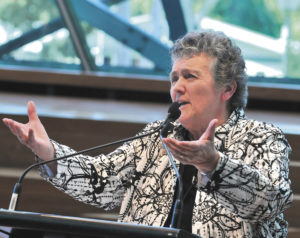
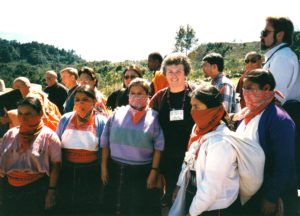
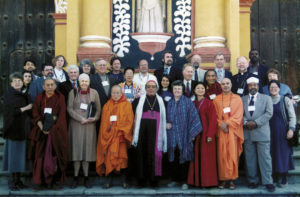
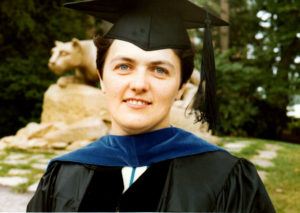
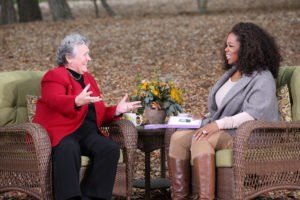






I found this so inspiring; partly because I just turned 80 and am tempted to think there’s nothing I can do. The fact that Sr. Joan is 82 and has written this book (which I mean to get as soon as possible) and is still actively speaking her truth helps me to realize that there are times when it’s OK to disagree instead of being silent and feeling guilty and cowardly for not being an advocate for someone who is being disparaged or downtrodden.
Loved your comment, Hilda – thank you! So glad you were inspired by our interview. Sr. Joan is indeed amazing. I’m rooting for you Hilda – dare to be brave!
I too am inspired by Sr. Joan’s approach. I am presently reading her book “The breath of the SOUL”, reflections on prayer, with a friend. We are both astonished and uplifted by the connections she makes with wisdom and prophetic traditions of the world religions. We both practice kriya yoga from the east and it gives us a grounding and a courage to speak the truth in the NOW, which is the only “reality” we can affect with our freedom. cf. Luke 24. I am really looking forward to reading her latest book: The Time is NOW, and incorporating its insights and suggested praxes into my life. I also believe that the much maligned millenials whom I heard being interviewed on “The Current” on the CBC radio today, & who are suffering from burn-out, would do well to take her as their elder “auntie” and join up with the Monastery of the Heart out of Erie PA. Imagine! Millions of millenials sharing in small groups and encouraging one another to take on the Benedictine balance of contemplation and action! (I’m a pre-baby-boomer who taught in the Ontario Secondary Schools for 23 years.)
We have become too comfortable in our pews, we don’t recognize our distant neighbours. If we are too heavenly minded we are no earthly use.
I am a cradle Catholic and recently realized I stayed in my comfort zone as a practicing Catholic. However, since Pope Francis announced the SYNOD I have committed to offer all of my time to help it to become successful. We have faced total denial from our pastor and bishop, that there is even a SYNOD. My question is ” Are you doing any type of support on the SYNOD?